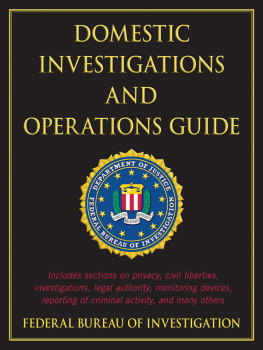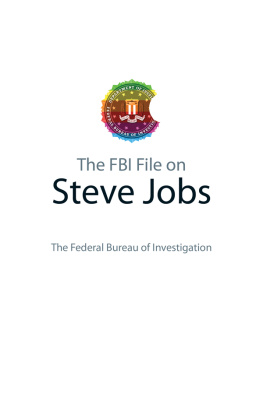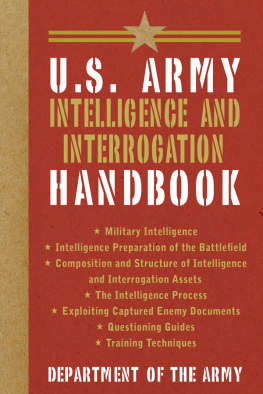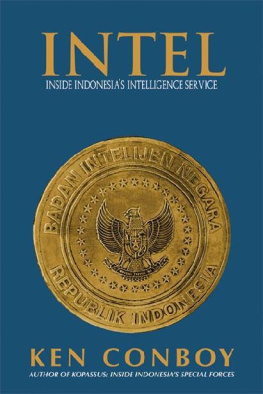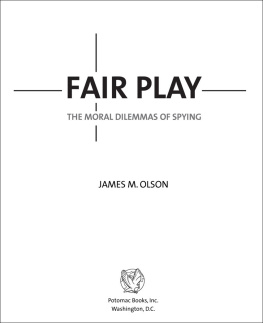Copyright 2008, 2012 by Federal Bureau of Investigation
All Rights Reserved. No part of this book may be reproduced in any manner without the express written consent of the publisher, except in the case of brief excerpts in critical reviews or articles. All inquiries should be addressed to Skyhorse Publishing, 307 West 36th Street, 11th Floor, New York, NY 10018.
Skyhorse Publishing books may be purchased in bulk at special discounts for sales promotion, corporate gifts, fund-raising, or educational purposes. Special editions can also be created to specifications. For details, contact the Special Sales Department, Skyhorse Publishing, 307 West 36th Street, 11th Floor, New York, NY 10018 or info@skyhorsepublishing.com.
Skyhorse and Skyhorse Publishing are registered trademarks of
Skyhorse Publishing, Inc., a Delaware corporation.
Visit our website at www.skyhorsepublishing.com.
10 9 8 7 6 5 4 3 2 1
Library of Congress Cataloging-in-Publication Data is available on file.
ISBN: 978-1-61608-549-0
Printed in Canada
Table of Contents
List of Appendices
Appendix A: The Attorney Generals Guidelines for Domestic FBI Operations
Appendix B: Executive Order 12333
Appendix C: Sensitive Operations Review Committee
Appendix D: Superceded Documents and NFIP, MIOG, and MAOP Sections
Appendix E: Key Words, Definitions, and Links
Appendix F: Acronyms
Appendix G: Investigations Manual Classified Provisions
(U) Preamble
December 1,2008
(U) As the primary investigative agency of the federal government, the FBI has the authority and responsibility to investigate all violations of federal law that are not exclusively assigned to another federal agency. The FBI is further vested by law and by Presidential directives with the primary role in carrying out criminal investigations and investigations of threats to the national security of the United States. This includes the lead domestic role in investigating international terrorist threats to the United States, and in conducting counterintelligence activities to counter foreign entities's espionage and intelligence efforts directed against the United States. The FBI is also vested with important functions in collecting foreign intelligence as a member agency of the United States Intelligence Community (USIC). (AGG-Dom, Introduction)
(U) While investigating crime, terrorism, and threats to the national security, and collecting foreign intelligence, the FBI must fully comply with all laws and regulations, including those designed to protect civil liberties and privacy. Through compliance, the FBI will continue to earn the support, confidence and respect of the people of the United States.
(U) To assist the FBI in its mission, the Attorney General signed The Attorney Generals Guidelines for Domestic FBI Operations (AGG-Dom) on September 29, 2008. The primary purpose of the AGG-Dom and the Domestic Investigations and Operations Guide (DIOG) is to standardize policy so that criminal, national security, and foreign intelligence investigative activities are accomplished in a consistent manner, whenever possible (e.g., same approval, notification, and reporting requirements). In addition to the DIOG, each FBIHQ substantive Division has a policy implementation guide (PG) that supplements this document. Numerous FBI manuals, electronic communications, letterhead memoranda, and other policy documents are incorporated-into the DIOG and the substantive Division policy implementation guides, thus, consolidating the FBIs policy guidance. The FBIHQ Corporate Policy Office (CPO) plays an instrumental role in this endeavor. Specifically, the CPO maintains the most current version of the DIOG on its website. As federal statutes, executive orders, Attorney General guidelines, FBI policies, or other relevant authorities change, CPO will electronically update the DIOG after appropriate coordination and required approvals.
(U) The changes implemented by the DIOG should better equip you to protect the people of the United States against crime and threats to the national security and to collect foreign intelligence. This is your document, and it requires your input so that we can provide the best service to our nation. If you discover a need for change, please forward your suggestion to FBIHQ CPO.
(U) Thank you for your outstanding service!
Robert S. Mueller, III
Director
1. (U) Scope and Purpose
1.1. (U) Scope
(U) The DIOG applies to all investigative activities and intelligence collection activities conducted by the FBI within the United States or outside the territories of all countries. This policy document does not apply to investigative and intelligence collection activities of the FBI in foreign countries; those are governed by The Attorney Generals Guidelines for Extraterritorial FBI Operations.
1.2. (U) Purpose
(U) The purpose of the DIOG is to standardize policy so that criminal, national security, and foreign intelligence investigative activities are consistently and uniformly accomplished whenever possible (e.g., same approval, notification, and reporting requirements).
(U) This policy document also stresses the importance of oversight and self-regulation to ensure that all investigative and intelligence collection activities are conducted within Constitutional and statutory parameters and that civil liberties and privacy are protected.
(U) In addition to this policy document, each FBIHQ substantive Division has a PG that supplements the DIOG. As a result, numerous FBI manuals, electronic communications, letterhead memoranda, and other policy documents are incorporated into the DIOG and Division PGs, thus, consolidating FBI policy guidance.
2. (U) General Authorities and Principles
2.1. (U) Scope of the Attorney Generals Guidelines for Domestic FBI Operations
(U) The Attorney Generals Guidelines for Domestic FBI Operations (AGG-Dom) apply to investigative and intelligence collection activities conducted by the FBI within the United States, in the United States territories, or outside the territories of all countries. They do not apply to investigative and intelligence collection activities of the FBI in foreign countries, which will be governed by the Attorney Generals Guidelines for Extraterritorial FBI Operations, when published. (Reference: AGG-Dom, Part I.A.)
(U) The AGG-Dom replaces the following six guidelines:
(U) The Attorney Generals Guidelines on General Crimes, Racketeering Enterprise and Terrorism Enterprise Investigations (May 30, 2002)
(U) The Attorney Generals Guidelines for FBI National Security Investigations and Foreign Intelligence Collection (October 31, 2003)
(U) The Attorney Generals Supplemental Guidelines for Collection, Retention, and Dissemination of Foreign Intelligence (November 29,2006)
(U) The Attorney General Procedure for Reporting and Use of Information Concerning Violations of Law and Authorization for Participation in Otherwise Illegal Activity in FBI Foreign Intelligence, Counterintelligence or International Terrorism Intelligence Investigations (August 8, 1988).
(U) The Attorney Generals Guidelines for Reporting on Civil Disorders and Demonstrations Involving a Federal Interest (April 5, 1976)
(U) The Attorney Generals Procedures for Lawful, Warrantless Monitoring of Verbal Communications (May 30, 2002) [only portion applicable to FBI repealed]
(U) The Attorney General will be issuing a separate set of new guidelines for extraterritorial operations, the

